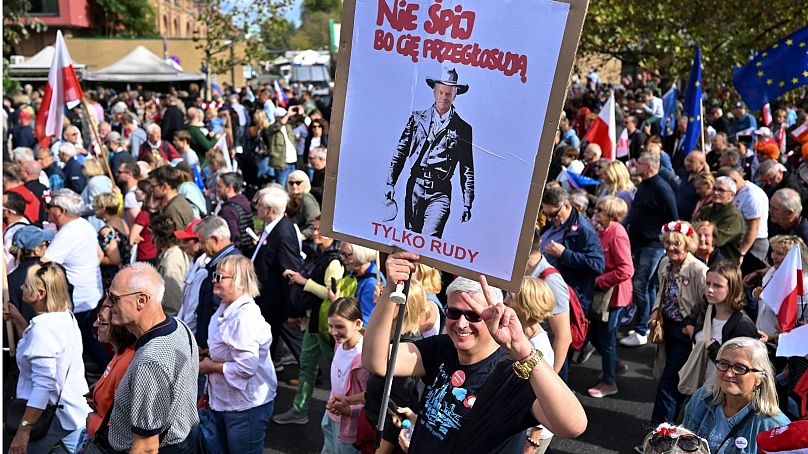Over half a million Poles abroad registered to vote in the Sunday 15 October election, in which Donald Tusk’s opposition party hopes to unseat the ruling nationalist Law and Justice party.
A record number of Poles abroad registered to vote in the incoming parliamentary election which could see the ruling Law and Justice party (PiS) being dethroned - or solidify their grip on the country with a third term in government.
According to local newspapers, more than half a million members of the Polish diaspora - more than the population of its sixth-largest city, Gdansk - signed up to cast their ballot on Sunday, and their vote could be crucial.
The deadline for the registration was Tuesday, and the number of Poles abroad who will vote was expected to surge to over 600,000 before midnight, as Polish foreign minister Zbigniew Rau said earlier on the same day.
“Four years ago there were 314,000 [voters registered abroad]; at the moment there [are] 560,000,” Rau said during a press conference, adding that the number would be a record in Poland’s history.
Rau said that because of the huge demand from Polish citizens abroad, which sparked fears that polling stations would not be able to cope with the volume of voters, the country had to increase the number of overseas electoral commissions by 70%.
Who will the diaspora vote for?
An estimated 5 million Poles currently live abroad and, based on the precedent of the 2019 parliamentary election, they historically vote for the opposition to Law and Justice - in this case, giving Donald Tusk’s Civic Coalition party (KO) some hope for Sunday.
The right-wing, populist Law and Justice party has been in power since 2015. During their years in government, they have been accused of politicising the judiciary, tightening their control on national media, and limiting abortion access to the point of a near-total ban.
While in 2019 Law and Justice won 43.6% of the vote, the party is now several percentage points below that level of success at 38% as of 9 September, according to a recent POLITICO poll.
Trailing behind Law and Justice is Tusk’s Civic Coalition party with 30% of the vote and the far-right Confederation Freedom and Independence - Konfederacja Wolsność i Niepodległość - with 11% of the vote.
Current polls suggest that Poland’s next government might be led by a coalition as Law and Justice fails to reach an overall majority.
Fears of irregularities
One thing we know is that Poles abroad will have to cast their ballot before Polish citizens at home. According to new electoral rules signed into law by the Law and Justice party, counts of overseas votes have to be submitted up to 24 hours after polls close - a measure which has been criticised as unconstitutional by Poland’s human rights commissioner as it disenfranchises voters abroad.
If the votes are not submitted on time, they’re considered null and void.
“This violates the essence of electoral law and makes the validity and effectiveness of the vote dependent on circumstances that are beyond the citizen’s control and result from problems with the efficiency of the electoral administration,” wrote the commissioner on X, formerly known as Twitter.
A poll in January conducted by local newspaper Dziennik Gazeta Prawna and broadcaster RMF FM found that nearly half of all Polish people (47.3%) feared the October election could be rigged.
On Wednesday, Civic Coalition candidate Aleksander Pociej wrote on X that “over 40 electoral commissions are at risk of being unable to count votes,” though he did not provide further details or evidence to support his claim.
Poland's smaller parties could tip the balance
Another factor in determining the results of the election could be Poland's smaller parties.
That is because early polling suggests that neither the Law and Justice party nor the Civic Platform party have enough support to gain an outright majority to govern on their own -- meaning they may have to really on coalitions with smaller parties.
One possible alliance could be between the New Left, Civic Coalition and the Third Way.
Agata Diduszko-Zyglewska, a member of New Left, told Euronews her party is establishing a plan of action with the other parties, and "this will certainly include the recovery of the rule of law".
"We will certainly be the guardians of women's rights, separation of state and church. These are key issues which have brought hundreds of thousands of people onto the streets and which directly affect the safety, health and freedom of people in Poland."
Poland could also turn towards the extreme right, with a possible alliance between the current ruling party and the ultra-nationalist Konfederacja party, but differences over the country's finances could stand in their way
"We are in favour of economic freedom; simple, low taxes; less regulation; managing our own money and not taking it for the budget, our slogans are pro-entrepreneurial, Christian." Krzysztof Bosak, a member of Konfederacja, told Euronews.
"We don't see a chance to implement our programme ideas with either Law and Justice or Civic Platform parties, therefore we expect that we will probably be in opposition after the elections."

